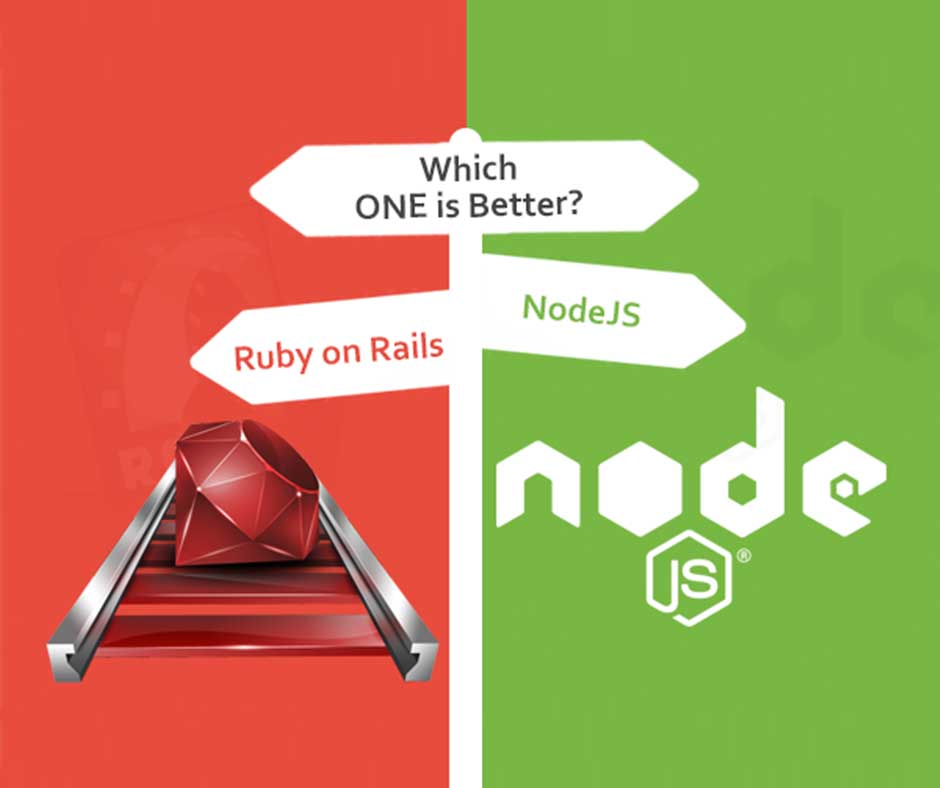[yasr_overall_rating] Over 358 people have rated [4.8/5]
A new technology takes birth. It introduced to the general public. The aim of most newer technologies is to solve the computational problems that has often been faced by other older technologies. We will study the shortcomings that older technology faced. Because of the shortcomings that were faced by older technologies, what has led to the invention of newer programming technologies that solves computing problems. Particularly, in the field of web development and server side app development, this has taken place drastically and has led to the invention of newer and more upcoming advancements in the field of web technologies. We will be differentiating between the newer and the older technologies and will see what enhancements are done to them to solve the computation problems that existed.
In this article we are going to compare and contrast two technologies, that is NodeJS and Ruby on Rails(Nodejs vs Ruby on Rails). Both of these frameworks are developed for web application designing and programming. Let see what sets them apart as well as the similarities and differences between each of them.
Table of Contents
ToggleDifference between Ruby On Rails and NodeJS:
NodeJS is a runtime library and an environment that is cross-platform compatible and is mainly used for creating JavaScript-based applications that run outside the browser. It is free to use as well as open-source and is utilized for developing server-side applications. NodeJS allows developers to run applications on the server-side of the web architecture.
Ruby on Rails is a server-side web application framework written using the Ruby language. The Ruby language is general purpose. Ruby on Rails helps with the rapid application development approach that is used to assist developers with a lot of built-in features and enables the developer to focus solely on the application of business logic. An open-source Rails framework is the ideal platform for developing a web application that is backed by using a database.
NodeJS
NodeJS provides a way that is much faster to write scripts that are light and scalable. Programmers and developers are able to write real-time applications, and at the same time provide some scope for mobile application development. Developers can easily utilize both the front end and the back end development using the same JavaScript code
There are several server-side capabilities that NodeJS is able to provide. A developer is able to listen to and can reply to HTTP requests on the computer, listening to the network traffic and at the same time access a database from the computer directly.
NodeJS uses an event-based model in order to address scalability, and allow the development using rich JavaScript libraries for JavaScript modules and this helps in simplifying the code logic.
There are plenty of frameworks that are based using NodeJS, for example, Expresses, Partial JS, etc. When the question is about building fast and scalable server-side applications, then NodeJS is the clear cut winner here. NodeJS provides JavaScript the ability to interact in real-time with I/O devices (Input/Output Devices) through the use of its APIs, it can also connect with external libraries that are written in various other languages.
Recommended Reading: Asp.NET vs Node JS
Ruby On Rails
Ruby On Rails is an MVC (Model-View-Controller) based web framework that is able to provide a structure for a database, webpages as well as web services. There are various wen standards such as JSON and XML that are used for data transfer purposes and are facilitated by Rails. There are some other paradigms that are promoted and supported by Rails such as CoC (Convention Over Configuration) and DRY(Don’t Repeat Yourself) and the active record pattern.
Ruby On Rails is loaded with several features that is aimed at making the developer more productive and efficient, by providing the ability like meta-programming. Compared to any other framework that uses code generation from scratch but Rails uses meta-programming techniques. Rails also provide code generation techniques but it uses meta-programming for heavier tasks. An active record would provide saving the object to the database. Rails do not use much of the configuration techniques but prefer the use of the conventional approach.
Rails that made its mark in the early 2000s have greatly impacted the web development field through the introduction of many innovative features such as seamless database table creations, migrations to enable rapid application development, and so on. Its influence on other frameworks is pretty apparent.
Ruby on Rails also includes some tools that make common development tasks much easier for example scaffolding that can automatically create and construct some of the models and views that are required for the website. Another tool is WE Brick, which is a ruby web server that is distributed with Ruby. Using together with Rails, these tools are capable to provide a basic development environment. Rails also has an advanced level of support for JavaScript libraries as well. Initially it utilizes lightweight SOAP web services but it is later replaced by REST web services.
You may also like to know: Ruby vs Ruby on Rails
Head To Head Comparison of NodeJS VS RoR(Nodejs vs Ruby on Rails):
| NodeJS | Ruby On Rails |
| The NodeJS framework is developed using C, C++ and JavaScript | Ruby on Rails framework is developed using Ruby. |
| The application developed in NodeJS are fast and scalable that run on the server-side | Applications developed using RoR are database-backed web applications and uses meta programming |
| NodeJS is extremely useful when the requirement is for developing applications that are scalable as well as fast. | RoR is best suited for large scale applications. |
| Developers can use NodeJS applications for both on the client-side as well as the server-side | RoR is an entirely a server-side framework and does not have any client-side support |
| For using NodeJS, you need to install the archive file on the system | For using RoR, you need a precompiled version of Ruby via the RubyInstaller / RailsInstaller |
| Applications that are written using NodeJS are Highly Scalable | Applications written using RoR are less scalable compared to NodeJS applications |
| The page load speed is faster across the site | The page load speed is slower compared to NodeJS |
| There is a huge market demand for NodeJS developers | RoR is not as popular compared to NodeJS in the current scenario |
Key differences between NodeJS and Ruby On Rails(Nodejs vs Ruby on Rails).
- Node JS is ideal for developing small size projects whereas Rails is a web application framework, well suited for database-backed web applications in MVC pattern, released in 2008.
- NodeJS is written with the use of JavaScript whereas Ruby on Rails is written in Ruby which is easy to learn, with understanding syntax, released under an MIT license.
- NodeJS is best suited for I/O non-blocking, event-based application. Rails is better suited for meta programming and database-backed modern web programming.
- NodeJS is derived from event-driven model architecture. Rails follows a model-view-controller pattern, the model represents the data that is handled in an Active Record.
- NodeJS provides capabilities to create own web servers which will handle HTTP request asynchronously. Rails uses WE Brick, Apache, NGINX, Cherokee.
- NodeJS has a moderately sized community that is helpful with lots of projects available with Github . Rails has a huge and strong community of developers along with a huge repository of Github.
- Well versed JavaScript programmer can learn NodeJS concept efficiently . Rails has a steep learning curve, recommended for seasoned programmers.
- NodeJS has an event-driven model and this is based on the asynchronous call. The philosophy for Rails revolves around convention over configuration principle.
- NodeJS is easier to install with some archive files that need to be installed on the system. The Rails installation process is longer than NodeJS.
- NodeJS has an interpreter that is used to interpret and execute JavaScript code. Rails has a built-in static compilation that uses Coffee Script by default.
Read More: How is M-Commerce Beneficial for Modern Business
Conclusion:
NodeJS and RoR are two different technologies that have its own benefits or uses as well as their pros and cons. Each technology for usage depends on the scenario and the uses that you want to harness and make use of in your applications. It all depends on your personal preferences and what you like the most on these platforms or languages.
If you liked this article on Nodejs vs Ruby on Rails and have found it to be informative, then you can check out our other articles. If you want to hire Node JS developers or if you’re looking to hire Ruby On Rails developer for your project then contact us on enquiry@nimapinfotech.com. We have expert professionals ready to onboard for your project.
Author
-

Sagar Nagda is the Founder and Owner of Nimap Infotech, a leading IT outsourcing and project management company specializing in web and mobile app development. With an MBA from Bocconi University, Italy, and a Digital Marketing specialization from UCLA, Sagar blends business acumen with digital expertise. He has organically scaled Nimap Infotech, serving 500+ clients with over 1200 projects delivered.
View all posts








